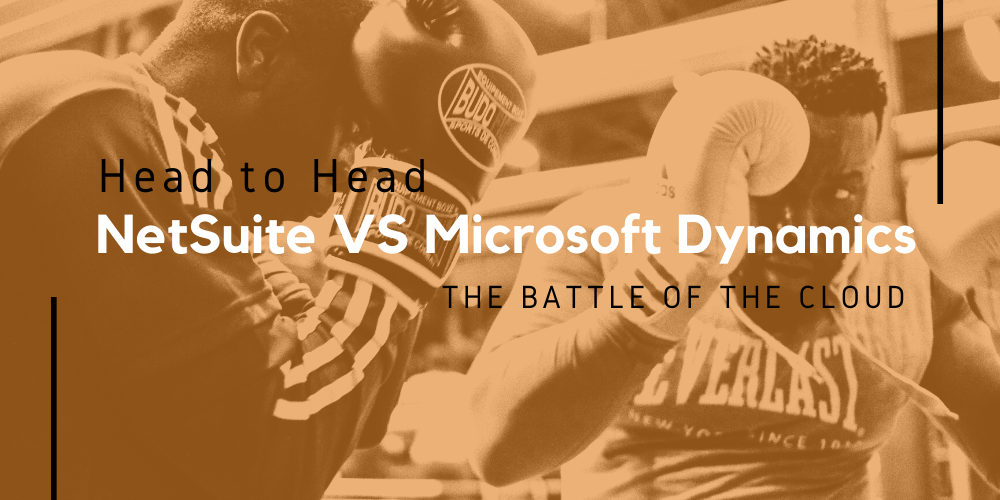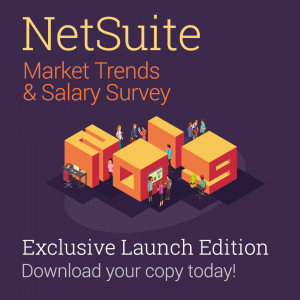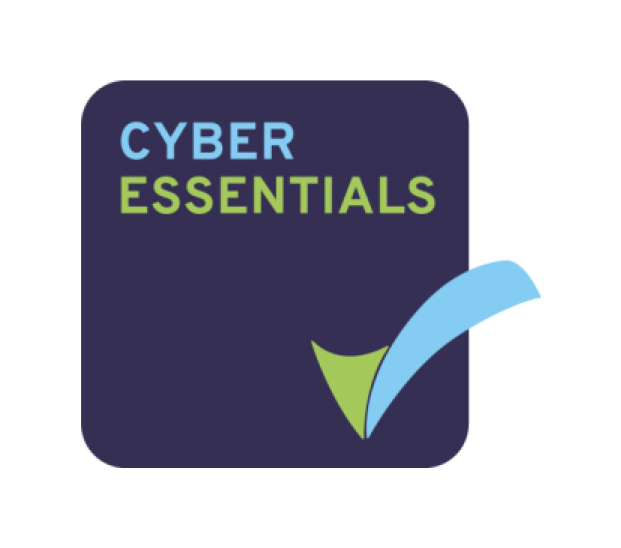
When your business needs a new software solution, it sometimes seems like the choices are endless, making it nearly impossible to make a decision.
In a market saturated with options, we thought we’d give you a helping hand. We’re running a series of comparison articles and first up are two of the major cloud-based forces: NetSuite vs Microsoft Dynamics. In this blog post, we will pit two of the big-hitters against each other in a NetSuite vs Microsoft Dynamics head-to-head situation. The two vendors have a host of similarities, with both targeting small to midsize companies by offering CRM, ERP and e-commerce solutions.
NetSuite is a ‘pure’ cloud solution, with just a username and password required to access your information. Microsoft Dynamics GRP and Microsoft Dynamics SL, on the other hand, are hosted solutions.
We will answer any questions you may have about comparing the two vendors to make sure you make a well-informed final decision and relieve you of any stress. First, we’ll examine ERP systems, but if it’s CRM information that you’re looking for, click here to speed on through.
What is a NetSuite ERP?
NetSuite ERP is a system targeted at high-growing mid-sized companies and automates front and back-office processes, including:
- Financial management
- Revenue management
- Fixed assets
- Order management
- Billing
- Inventory management
What is Microsoft Dynamics GP?
Microsoft Dynamics GP revamps the ‘old faithful’ Microsoft productivity tools, such as MS Office, MS SharePoint, and SQL databases to help enterprises efficiently manage their finances. It offers businesses the chance to use a cloud-based system via third-party partners but also gives you the option to implement an on-premise system.
NetSuite ERP vs Microsoft Dynamics GP: pricing
Netuite doesn’t publicly list their prices, with businesses who are interested in using the software needing to contact the company or a provider directly. They will then provide them with a customized quote to suit their needs. The number of monthly system users, add-ons, and modules that your company needs to determine the price.
MS Dynamics GP, on the other hand, is sold via an independent software vendor (ISV). These are a network of accredited resellers, and their pricing models include:
- Perpetual licensing
- Subscription licensing
- Dynamics GP subscription fee
- Dynamics GP hosting fee for ‘buy your own license’
Perpetual licensing is designed to give small and medium-sized enterprises an affordable upfront license fee. To set this up, you must pay a monthly fee to an ISV.
Subscription licensing allows a business to keep the upfront cost to a minimum as they are set up on a per-user, per-month basis.
A Dynamics GP subscription fee costs $214 per named user/per month, or $239 if you are using the Dynamics GP extended pack. There is also a one-off data setup fee of $2,495. This covers backups, security and server maintenance, as well as including the Microsoft Business Ready Enhancement Plan. SQL, Windows, Office Professional and all other supporting licensing are also included, but ISV product subscriptions require an additional monthly fee.
Like a Dynamics GP subscription fee, a Dynamics GP hosting fee for ‘buy your own license’ requires a one-time data center setup fee of $2,495. The price per user/per month is $134, or $159 if you need the Dynamics GP extended pack. You will own all the dexterity-based ISV products at no added cost and, like the previous option, you will receive SQL, Windows, Office Professional and all other supporting licensing. However, it doesn’t include the Microsoft Business Ready Enhancement Plan.

Gain further insight into a NetSuite implementation
Download our annual, independent report of market trends, products, and sentiments within the NetSuite industry.
NetSuite ERP vs Microsoft Dynamics GP: features
NetSuite ERP’s features can be broken down into eight categories:
- Accounting
- Fixed asset management
- Payment management
- Demand planning
- Manufacturing
- Billing management and invoicing
- Inventory control and warehouse management
- Purchasing and vendor management
| Category | Features |
| Accounting |
|
| Fixed asset management |
|
| Payment management |
|
| Demand planning |
|
| Manufacturing |
|
| Inventory control and warehouse management |
|
| Billing management and invoicing |
|
| Inventory control and warehouse management |
|
| Purchasing and vendor management |
|
Microsoft Dynamics GP is also broken down into five categories:
- Financial management
- Human resources management
- Business intelligence and reporting
- Workspace collaboration
- Supply chain management
| Category | Features |
| Financial management |
|
| Human resources management |
|
| Business intelligence and reporting |
|
| Workspace collaboration |
|
| Supply chain management |
|
NetSuite ERP vs Microsoft Dynamics GP: pros and cons
So, it’s clear that both NetSuite ERP and Microsoft Dynamics GP have an extensive list of features to offer your business. But, not all can be advantageous, right? Let’s have a look at what’s good and bad about both systems to help you make that vital decision.
Pros: NetSuite ERP
- If you’re a multinational company, this solution offers the opportunity to work in several languages.
- It’s also very flexible to which operating system you complete your tasks on. The systems supported include Windows, Android, iPhone/iPad, Web-based, Android, and Mac.
- The software is very powerful and offers a lot of functions and features that help you to customize it to your needs. The dynamic interface allows you to set up everything you need in one place.
- As it’s a cloud-based ERP system, the provider is responsible for all hosting and maintenance activities which will leave you (the customer) able to focus on using ERP.
- Since NetSuite began as accounting software, it’s been able to perfect its financial management feature over time, and many regard it as the world’s top financial management solution.
Pros: Microsoft Dynamics GP
- The system has a powerful, role-specific insight that allows additional information tracking.
- The reported budget can be set by year, quarter or month, allowing streamlining of reporting processes, expense reports, and project timesheets.
- The software easily integrates with Microsoft’s productivity tools, including MS Office, Microsoft SharePoint, and SQL server database.
- It has a fast deployment through RapidStart Services.
- The software can automate and simplify your payroll processes.
Cons: NetSuite ERP
- The software doesn’t allow you to view a summary when reviewing your sales orders.
- Its dated interface can be hard to navigate
- Since it’s cloud-based, any changes are made automatically by the vendor, meaning you may find you run into unwanted changes.
Cons: Microsoft Dynamics GP
- Critics argue that the architecture is outdated.
- The software comes with a significant cost.

NetSuite CRM vs Microsoft Dynamics 365
As with ERP, there are plenty of options to choose from if you require CRM products. And again, it’s crucial that you thoroughly compare vendors before choosing which CRM is most suitable for your business.
Here, we will discuss precisely what NetSuite CRM is, what Microsoft Dynamics 365 is, as well as comparing pricing and features, before allowing you to read the pros and cons of both systems.
What is NetSuite CRM+?
NetSuite boasts that its robust and powerful CRM solution can provide a company with a complete full view of their customers in real time and ‘drives the complete customer lifecycle.’ It can provide users with more than just the traditional features on offer by most CRM systems.
The product, released in 2005, marked NetSuite’s shift from sole accounting software to a comprehensive business solution provider.
What is Microsoft Dynamics 365?
Microsoft’s Dynamics 365 CRM solution is a repackaged version of what used to be the Dynamics CRM Online tool. Launched two years before NetSuite CRM, Dynamics 365 didn’t start life in cloud form until 2011.
NetSuite CRM+ vs Microsoft Dynamics 365: pricing
Like NetSuite ERP, the price guide for NetSuite CRM+ is available on request by contacting NetSuite or a solution provider directly. With a subscription pricing model, costs start at $129 per month.
Dynamics 365, on the other hand, is much more transparent with how much you’d be expected to pay for the solution. Price guides come in two sections: Enterprise edition and Business edition. In each version, there are different plans which you can pay for.
Enterprise edition
For full use of Dynamic 365’s applications in a single comprehensive and cost-efficient option, a business should choose the Dynamics 365 plan, which starts at $210 per user/month.
A cheaper alternative would be the Unified Operations plan. This will cost you $190 per user/month and will allow you access to all the applications which will help connect and manage your business operations.
The Customer Engagement plan costs $115 per user/month and offers use of the applications that support your customer relationships as well as build them.
If it’s just specific applications you require, the price ranges from $40 to $170 per user/month but gives you the option to upgrade your plans as your business grows.
Business edition
For full access to application functionality, you can expect to pay $40 per user/month for the Full user pricing plan. Team members will pay from as low as $5 per user/month to have access to basic processes that allow you to execute light tasks.
If you have purchased the Full user plan, you will get the External accountant license free, which gains you access to the service at no extra cost.
Microsoft Dynamics 365 vs NetSuite CRM: features
NetSuite CRM+
NetSuite recognizes the fact that successful companies are responsive to customer needs and split their product into easily accessible modules which all offer different features.
| Module | Features |
| Sales Force Automation |
|
| Customer service and support |
|
| Marketing automation |
|
| Ecommerce and flexible customization |
|
Microsoft Dynamics 365
Users of Microsoft Dynamics 365 have the option to pick and choose which features they need for their business. This is beneficial as, on top of the major apps provided, there’s the opportunity to utilize their additional apps, including:
- Project service automation
- Field service
- Microsoft social engagement
- Microsoft relationship sales
The main modules offer a host of features. Here’s an overview:
| Module | Features |
| Dynamics 365 for customer service |
|
| Microsoft social engagement |
|
| Dynamics 365 for sales |
|
NetSuite CRM+ vs Microsoft Dynamics 365: pros and cons
Pros: NetSuite CRM+
- The software provides a flow of information throughout the lifecycle of the customer, while also streamlining your business’s lead-to-cash processes.
- It can enhance productivity levels across the business with a 360-degrees overview of your customer portfolio.
- NetSuite CRM+ can help improve your company’s sales performance thanks to forecasting, upselling and commission management.
- The software services organizations as well as managing global sales.
Pros: Microsoft Dynamics
- Dynamics 365 works well with LinkedIn, as well as Microsoft products, such as Outlook and Office.
- There are more reporting options available if you chose Dynamics 365 ahead of NetSuite CRM+.
- As Dynamics 365 is a single-tenant solution, users have full control of their updates. They can choose whether or not to regularly implement these updates so that it won’t hinder their operations.
Cons: NetSuite CRM+
- Commonly used productivity tools, including Skype, can’t be integrated.
- NetSuite at present doesn’t utilize the option to use personal AI assistants.
Cons: Dynamics 365
- There may be a prolonged set-up due to the number of functions and capabilities being overpowering.
- It’s still a relatively new product so hasn’t built up a proven reputation as of yet.
A cloud system that’s right for your business
If you’re still unsure on which ERP or CRM system will be the best fit for your business, both Dynamics 365 and NetSuite offer a free trial of their software that can help you see first hand which you will benefit from most. This post also gives an overview of what an ERP and CRM cloud system can do for your business.



